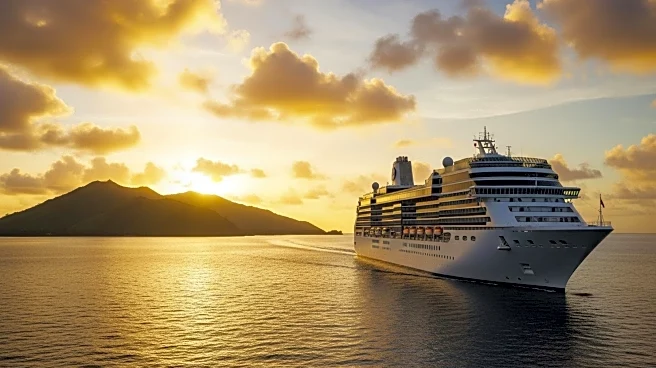What is the story about?
What's Happening?
The Cruise Lines International Association, along with other plaintiffs, has filed a lawsuit against the state of Hawaii over a newly implemented 'Green Fee' tax. This tax, which increases the transient accommodations tax by 0.75% to a total of 11%, is set to apply to cruise lines starting in 2026. The fee is intended to fund climate change resiliency projects and other environmental efforts. The plaintiffs argue that the tax violates federal law, specifically the Tonnage Clause of the U.S. Constitution, and imposes an undue burden on cruise lines and passengers. The lawsuit claims that the tax could significantly increase the cost of cruises to Hawaii, potentially deterring visitors and impacting the state's cruise tourism industry.
Why It's Important?
The lawsuit highlights the tension between environmental policy and economic interests in Hawaii. The cruise industry is a significant contributor to Hawaii's economy, generating over $600 million annually and attracting nearly 300,000 visitors. The new tax could affect the affordability and attractiveness of Hawaii as a cruise destination, potentially leading to a decrease in tourism revenue. This case could set a precedent for how states implement environmental taxes and balance them with economic impacts, especially in industries heavily reliant on tourism.
What's Next?
The Hawaii Department of the Attorney General has yet to be served the complaint and has reserved comment until it can review the lawsuit. The outcome of this legal challenge could influence future state policies on environmental taxation and its application to various sectors. Stakeholders, including local governments and tourism-related businesses, will be closely monitoring the case, as it could affect their operations and revenue streams.
Beyond the Headlines
This legal battle underscores the broader debate on how to effectively fund environmental initiatives without compromising economic growth. It raises questions about the fairness and legality of imposing additional costs on industries that are vital to local economies. The resolution of this case could impact how other states approach similar environmental funding strategies.
















